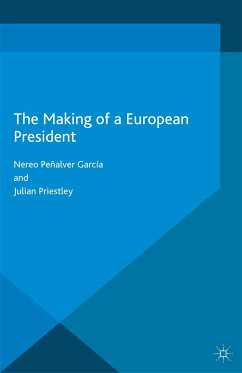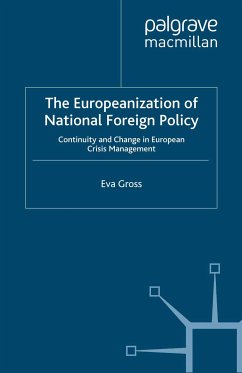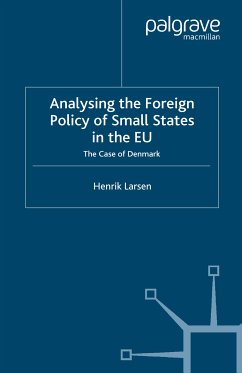The European External Action Service (eBook, PDF)
European Diplomacy Post-Westphalia
Redaktion: Spence, David; Bátora, Jozef
75,95 €
75,95 €
inkl. MwSt.
Sofort per Download lieferbar

38 °P sammeln
75,95 €
Als Download kaufen

75,95 €
inkl. MwSt.
Sofort per Download lieferbar

38 °P sammeln
Jetzt verschenken
Alle Infos zum eBook verschenken
75,95 €
inkl. MwSt.
Sofort per Download lieferbar
Alle Infos zum eBook verschenken

38 °P sammeln
The European External Action Service (eBook, PDF)
European Diplomacy Post-Westphalia
Redaktion: Spence, David; Bátora, Jozef
- Format: PDF
- Merkliste
- Auf die Merkliste
- Bewerten Bewerten
- Teilen
- Produkt teilen
- Produkterinnerung
- Produkterinnerung

Bitte loggen Sie sich zunächst in Ihr Kundenkonto ein oder registrieren Sie sich bei
bücher.de, um das eBook-Abo tolino select nutzen zu können.
Hier können Sie sich einloggen
Hier können Sie sich einloggen
Sie sind bereits eingeloggt. Klicken Sie auf 2. tolino select Abo, um fortzufahren.

Bitte loggen Sie sich zunächst in Ihr Kundenkonto ein oder registrieren Sie sich bei bücher.de, um das eBook-Abo tolino select nutzen zu können.
This book questions whether the institutions and practices of the emerging EU diplomatic system conform to established standards of the state-centric diplomatic order; or whether practice is paving the way for innovative, even revolutionary, forms of diplomatic organisation.
- Geräte: PC
- ohne Kopierschutz
- eBook Hilfe
- Größe: 2.75MB
Andere Kunden interessierten sich auch für
![European Civil Security Governance (eBook, PDF) European Civil Security Governance (eBook, PDF)]() European Civil Security Governance (eBook, PDF)40,95 €
European Civil Security Governance (eBook, PDF)40,95 €![EU Coordination in International Institutions (eBook, PDF) EU Coordination in International Institutions (eBook, PDF)]() Peter DebaereEU Coordination in International Institutions (eBook, PDF)40,95 €
Peter DebaereEU Coordination in International Institutions (eBook, PDF)40,95 €![The Making of a European President (eBook, PDF) The Making of a European President (eBook, PDF)]() Nereo Peñalver GarcíaThe Making of a European President (eBook, PDF)40,95 €
Nereo Peñalver GarcíaThe Making of a European President (eBook, PDF)40,95 €![The Europeanization of National Foreign Policy (eBook, PDF) The Europeanization of National Foreign Policy (eBook, PDF)]() E. GrossThe Europeanization of National Foreign Policy (eBook, PDF)40,95 €
E. GrossThe Europeanization of National Foreign Policy (eBook, PDF)40,95 €![Institutional and Policy Change in the European Parliament (eBook, PDF) Institutional and Policy Change in the European Parliament (eBook, PDF)]() Institutional and Policy Change in the European Parliament (eBook, PDF)40,95 €
Institutional and Policy Change in the European Parliament (eBook, PDF)40,95 €![Direct Elections to the European Parliament (eBook, PDF) Direct Elections to the European Parliament (eBook, PDF)]() Juliet LodgeDirect Elections to the European Parliament (eBook, PDF)73,95 €
Juliet LodgeDirect Elections to the European Parliament (eBook, PDF)73,95 €![Analysing the Foreign Policy of Small States in the EU (eBook, PDF) Analysing the Foreign Policy of Small States in the EU (eBook, PDF)]() H. LarsenAnalysing the Foreign Policy of Small States in the EU (eBook, PDF)40,95 €
H. LarsenAnalysing the Foreign Policy of Small States in the EU (eBook, PDF)40,95 €-
-
-
This book questions whether the institutions and practices of the emerging EU diplomatic system conform to established standards of the state-centric diplomatic order; or whether practice is paving the way for innovative, even revolutionary, forms of diplomatic organisation.
Dieser Download kann aus rechtlichen Gründen nur mit Rechnungsadresse in A, B, BG, CY, CZ, D, DK, EW, E, FIN, F, GR, HR, H, IRL, I, LT, L, LR, M, NL, PL, P, R, S, SLO, SK ausgeliefert werden.
Produktdetails
- Produktdetails
- Verlag: Palgrave Macmillan UK
- Seitenzahl: 427
- Erscheinungstermin: 18. August 2015
- Englisch
- ISBN-13: 9781137383037
- Artikelnr.: 43970274
- Verlag: Palgrave Macmillan UK
- Seitenzahl: 427
- Erscheinungstermin: 18. August 2015
- Englisch
- ISBN-13: 9781137383037
- Artikelnr.: 43970274
- Herstellerkennzeichnung Die Herstellerinformationen sind derzeit nicht verfügbar.
Rebecca Adler-Nissen, Associate Professor, Department of Political Science, University of Copenhagen, Denmark Frauke Austermann, is Lecturer and Head of Campus at the International School of Management, Cologne, and Research Associate at ESSCA School of Management, LUNAM University, France Rosa Balfour, Director, Europe in the World, European Policy Centre (EPC), Brussels, Belgium Jozef Bátora, Associate Professor and Director of the Institute of European Studies and International Relations at Comenius University in Bratislava, Slovakia Mai'a K. Davis Cross, Assistant Professor of Political Science and International Affairs at Northeastern University, USA Geert De Baere, Assistant Professor of International Law and EU Law at the Faculty of Law, Leuven Centre for Global Governance Studies, University of Leuven, Belgium Simon Duke, Professor, European Institute of Public Administration (EIPA), Maastricht, Netherlands Sanderijn Duquet, Fellow at the Research Foundation Flanders (FWO),Belgium Ana Mar Fernández Pasarín, Associate Professor in Politics and Public Administration, Autonomous University of Barcelona, Spain Bruno Hanses, EU official with extensive experience of European foreign and security policy Niklas Helwig, Senior Research Fellow, Finnish Institute of International Affairs, Helsinki, Finland Ana E. Juncos, Lecturer in European Politics at the School of Sociology, Politics and International Studies, University of Bristol, UK Katie Verlin Laatikainen, Associate Professor of Political Science, Adelphi University, New York, USA Lars Erik Lundin, Distinguished Associate Fellow, Stockholm International Peace Research Institute, Sweden Heidi Maurer, Assistant Professor, European Studies at the Department of Politics, Faculty of Arts and Social Sciences, Maastricht University, The Netherlands Frédéric Mérand, Associate Professor of Political Science and Director of CÉRIUM, the University of Montreal Centre for International Studies, Canada Zuzana Murdoch,Post-doctoral Research Fellow, University of Bremen, Germany Tereza Novotná, Post-Doctoral Researcher, Institute for European Studies, Université libre de Bruxelles, Belgium Cesare Onestini, Deputy Head of the European Union Delegation to India Karolina Pomorska, Assistant Professor, Maastricht University, The Netherlands, and Research Associate, Department of Politics and International Studies, University of Cambridge, UK Kristi Raik, Senior Research Fellow, Finnish Institute of International Affairs (FIIA) and Adjunct Professor, University of Turku, Finland Kolja Raube, Senior Researcher, Leuven Centre for Global Governance Studies, Belgium David Spence, Visiting Fellow, European Institute of the London School of Economics, UK Isabelle Tannous, Senior Information Research Specialist, German Institute for International and Security Affairs (SWP), Berlin, Germany Jarle Trondal, Professor of Public Administration, University of Agder, Norway Ramses A. Wessel, Professor of International and European Institutional Law and Co-Director of the Centre for European Studies at the University of Twente, The Netherlands Alison Weston, Head of Division with the Operations Directorate of the EU Military Staff, European External Action Service Jan Wouters, Full Professor of International Law and Jean Monnet Chair ad personam, Director, Leuven Centre for Global Governance Studies Institute for International Law, KU Leuven, Belgium
List of Tables
List of Figures
Notes on Contributors
Introduction: The EEAS as a Catalyst of Diplomatic Innovation; Jozef Bátora and David Spence
1. Theorizing the EU''s Diplomatic Service: Rational Player or Social Body?; Rebecca Adler-Nissen
PART I: THE NEW SETTING OF EU DIPLOMACY: problems and Prospects for the European External Action Service
2. The EEAS and its epistemic communities: the challenge of hybridism; David Spence
3. A hybrid service: organising efficient EU foreign policy; Cesare Onestini
4. The High Representative of the Union: the quest for leadership in EU foreign policy; Niklas Helwig
5. The Advance of a European Executive Order in Foreign Policy? Recruitment Practices in the European External Action Service (EEAS); Zuzana Murdoch and Jarle Trondal
6. The EEAS, EU External Assistance and Development Aid: Institutional Dissonance or Inter-service Harmony?; Isabelle Tannous
7. Democratic accountability and EU diplomacy: the EEAS and the role of the European Parliament; Kolja Raube
PART II: THE EEAS AND INTERNATIONAL LAW
8. Unus inter plures? The EEAS, the Vienna Convention and international diplomatic practice; Jan Wouters and Sanderijn Duquet
9. EU Law and the EEAS: Of Complex Competences and Constitutional Consequences; Geert De Baere and Ramses A. Wessel
PART III: EFFECTIVE MULTILATERALISM: EU DELEGATIONS TO INTERNATIONAL ORGANIZATIONS
10. The EU Delegation in New York: A Debut in High Political Drama; Katie Laatikainen
11. From the Convention to Lisbon: external competence and the uneasy transition for Geneva Delegations; David Spence
12. Effective multilateralism after Lisbon: the added value of the EEAS and the EU delegation in Vienna; Lars Erik Lundin
PART IV: BILATERALISM and EUROPEAN DIPLOMATIC CAPACITY
13. National adaptation and survival in a changing European diplomacy; Rosa Balfour and Kristi Raik
14. Europe in America: an upgraded EU delegation in a reinforced system of European diplomatic coordination; Heidi Maurer
15. Representing the EU in China: European Bilateral Diplomacy in a Competitive Diplomatic Environment; Frauke Austermann
16. Structural Diplomacy and foreign policy: the Case of the EU Delegation in the Democratic Republic of the Congo; Bruno Hanses and David Spence
PART V: ORGANIZING FOR A COMPREHENSIVE DIPLOMATIC APPROACH
17. The EEAS and Crisis Management: the Organisational Challenges of a Comprehensive Approach; Allison Weston and Frederic Mérand
18. The Public Diplomacy Role of the EEAS: crafting a Resilient Image for Europe; Mai''a K. Davis Cross
19. Towards a EU Consular policy?; Ana Mar Fernandez-Pasarin
PART VI: HUMAN RESOURCES AND DIPLOMATIC TRAINING
20. Attitudes, identities and esprit de corps in the EEAS; Ana Juncos and Karolina Pomorska
21. Women in the EEAS: another Post-Westphalia Change?; Tereza Novotná
22. Preparing the Future: Diplomatic Training in the EU; Simon Duke
Index
List of Figures
Notes on Contributors
Introduction: The EEAS as a Catalyst of Diplomatic Innovation; Jozef Bátora and David Spence
1. Theorizing the EU''s Diplomatic Service: Rational Player or Social Body?; Rebecca Adler-Nissen
PART I: THE NEW SETTING OF EU DIPLOMACY: problems and Prospects for the European External Action Service
2. The EEAS and its epistemic communities: the challenge of hybridism; David Spence
3. A hybrid service: organising efficient EU foreign policy; Cesare Onestini
4. The High Representative of the Union: the quest for leadership in EU foreign policy; Niklas Helwig
5. The Advance of a European Executive Order in Foreign Policy? Recruitment Practices in the European External Action Service (EEAS); Zuzana Murdoch and Jarle Trondal
6. The EEAS, EU External Assistance and Development Aid: Institutional Dissonance or Inter-service Harmony?; Isabelle Tannous
7. Democratic accountability and EU diplomacy: the EEAS and the role of the European Parliament; Kolja Raube
PART II: THE EEAS AND INTERNATIONAL LAW
8. Unus inter plures? The EEAS, the Vienna Convention and international diplomatic practice; Jan Wouters and Sanderijn Duquet
9. EU Law and the EEAS: Of Complex Competences and Constitutional Consequences; Geert De Baere and Ramses A. Wessel
PART III: EFFECTIVE MULTILATERALISM: EU DELEGATIONS TO INTERNATIONAL ORGANIZATIONS
10. The EU Delegation in New York: A Debut in High Political Drama; Katie Laatikainen
11. From the Convention to Lisbon: external competence and the uneasy transition for Geneva Delegations; David Spence
12. Effective multilateralism after Lisbon: the added value of the EEAS and the EU delegation in Vienna; Lars Erik Lundin
PART IV: BILATERALISM and EUROPEAN DIPLOMATIC CAPACITY
13. National adaptation and survival in a changing European diplomacy; Rosa Balfour and Kristi Raik
14. Europe in America: an upgraded EU delegation in a reinforced system of European diplomatic coordination; Heidi Maurer
15. Representing the EU in China: European Bilateral Diplomacy in a Competitive Diplomatic Environment; Frauke Austermann
16. Structural Diplomacy and foreign policy: the Case of the EU Delegation in the Democratic Republic of the Congo; Bruno Hanses and David Spence
PART V: ORGANIZING FOR A COMPREHENSIVE DIPLOMATIC APPROACH
17. The EEAS and Crisis Management: the Organisational Challenges of a Comprehensive Approach; Allison Weston and Frederic Mérand
18. The Public Diplomacy Role of the EEAS: crafting a Resilient Image for Europe; Mai''a K. Davis Cross
19. Towards a EU Consular policy?; Ana Mar Fernandez-Pasarin
PART VI: HUMAN RESOURCES AND DIPLOMATIC TRAINING
20. Attitudes, identities and esprit de corps in the EEAS; Ana Juncos and Karolina Pomorska
21. Women in the EEAS: another Post-Westphalia Change?; Tereza Novotná
22. Preparing the Future: Diplomatic Training in the EU; Simon Duke
Index
List of Tables
List of Figures
Notes on Contributors
Introduction: The EEAS as a Catalyst of Diplomatic Innovation; Jozef Bátora and David Spence
1. Theorizing the EU''s Diplomatic Service: Rational Player or Social Body?; Rebecca Adler-Nissen
PART I: THE NEW SETTING OF EU DIPLOMACY: problems and Prospects for the European External Action Service
2. The EEAS and its epistemic communities: the challenge of hybridism; David Spence
3. A hybrid service: organising efficient EU foreign policy; Cesare Onestini
4. The High Representative of the Union: the quest for leadership in EU foreign policy; Niklas Helwig
5. The Advance of a European Executive Order in Foreign Policy? Recruitment Practices in the European External Action Service (EEAS); Zuzana Murdoch and Jarle Trondal
6. The EEAS, EU External Assistance and Development Aid: Institutional Dissonance or Inter-service Harmony?; Isabelle Tannous
7. Democratic accountability and EU diplomacy: the EEAS and the role of the European Parliament; Kolja Raube
PART II: THE EEAS AND INTERNATIONAL LAW
8. Unus inter plures? The EEAS, the Vienna Convention and international diplomatic practice; Jan Wouters and Sanderijn Duquet
9. EU Law and the EEAS: Of Complex Competences and Constitutional Consequences; Geert De Baere and Ramses A. Wessel
PART III: EFFECTIVE MULTILATERALISM: EU DELEGATIONS TO INTERNATIONAL ORGANIZATIONS
10. The EU Delegation in New York: A Debut in High Political Drama; Katie Laatikainen
11. From the Convention to Lisbon: external competence and the uneasy transition for Geneva Delegations; David Spence
12. Effective multilateralism after Lisbon: the added value of the EEAS and the EU delegation in Vienna; Lars Erik Lundin
PART IV: BILATERALISM and EUROPEAN DIPLOMATIC CAPACITY
13. National adaptation and survival in a changing European diplomacy; Rosa Balfour and Kristi Raik
14. Europe in America: an upgraded EU delegation in a reinforced system of European diplomatic coordination; Heidi Maurer
15. Representing the EU in China: European Bilateral Diplomacy in a Competitive Diplomatic Environment; Frauke Austermann
16. Structural Diplomacy and foreign policy: the Case of the EU Delegation in the Democratic Republic of the Congo; Bruno Hanses and David Spence
PART V: ORGANIZING FOR A COMPREHENSIVE DIPLOMATIC APPROACH
17. The EEAS and Crisis Management: the Organisational Challenges of a Comprehensive Approach; Allison Weston and Frederic Mérand
18. The Public Diplomacy Role of the EEAS: crafting a Resilient Image for Europe; Mai''a K. Davis Cross
19. Towards a EU Consular policy?; Ana Mar Fernandez-Pasarin
PART VI: HUMAN RESOURCES AND DIPLOMATIC TRAINING
20. Attitudes, identities and esprit de corps in the EEAS; Ana Juncos and Karolina Pomorska
21. Women in the EEAS: another Post-Westphalia Change?; Tereza Novotná
22. Preparing the Future: Diplomatic Training in the EU; Simon Duke
Index
List of Figures
Notes on Contributors
Introduction: The EEAS as a Catalyst of Diplomatic Innovation; Jozef Bátora and David Spence
1. Theorizing the EU''s Diplomatic Service: Rational Player or Social Body?; Rebecca Adler-Nissen
PART I: THE NEW SETTING OF EU DIPLOMACY: problems and Prospects for the European External Action Service
2. The EEAS and its epistemic communities: the challenge of hybridism; David Spence
3. A hybrid service: organising efficient EU foreign policy; Cesare Onestini
4. The High Representative of the Union: the quest for leadership in EU foreign policy; Niklas Helwig
5. The Advance of a European Executive Order in Foreign Policy? Recruitment Practices in the European External Action Service (EEAS); Zuzana Murdoch and Jarle Trondal
6. The EEAS, EU External Assistance and Development Aid: Institutional Dissonance or Inter-service Harmony?; Isabelle Tannous
7. Democratic accountability and EU diplomacy: the EEAS and the role of the European Parliament; Kolja Raube
PART II: THE EEAS AND INTERNATIONAL LAW
8. Unus inter plures? The EEAS, the Vienna Convention and international diplomatic practice; Jan Wouters and Sanderijn Duquet
9. EU Law and the EEAS: Of Complex Competences and Constitutional Consequences; Geert De Baere and Ramses A. Wessel
PART III: EFFECTIVE MULTILATERALISM: EU DELEGATIONS TO INTERNATIONAL ORGANIZATIONS
10. The EU Delegation in New York: A Debut in High Political Drama; Katie Laatikainen
11. From the Convention to Lisbon: external competence and the uneasy transition for Geneva Delegations; David Spence
12. Effective multilateralism after Lisbon: the added value of the EEAS and the EU delegation in Vienna; Lars Erik Lundin
PART IV: BILATERALISM and EUROPEAN DIPLOMATIC CAPACITY
13. National adaptation and survival in a changing European diplomacy; Rosa Balfour and Kristi Raik
14. Europe in America: an upgraded EU delegation in a reinforced system of European diplomatic coordination; Heidi Maurer
15. Representing the EU in China: European Bilateral Diplomacy in a Competitive Diplomatic Environment; Frauke Austermann
16. Structural Diplomacy and foreign policy: the Case of the EU Delegation in the Democratic Republic of the Congo; Bruno Hanses and David Spence
PART V: ORGANIZING FOR A COMPREHENSIVE DIPLOMATIC APPROACH
17. The EEAS and Crisis Management: the Organisational Challenges of a Comprehensive Approach; Allison Weston and Frederic Mérand
18. The Public Diplomacy Role of the EEAS: crafting a Resilient Image for Europe; Mai''a K. Davis Cross
19. Towards a EU Consular policy?; Ana Mar Fernandez-Pasarin
PART VI: HUMAN RESOURCES AND DIPLOMATIC TRAINING
20. Attitudes, identities and esprit de corps in the EEAS; Ana Juncos and Karolina Pomorska
21. Women in the EEAS: another Post-Westphalia Change?; Tereza Novotná
22. Preparing the Future: Diplomatic Training in the EU; Simon Duke
Index
"All chapters are written by well known scholars who have followed the Service since its inception. ... Given the style and level of detail, the book will certainly be of interest to scholars, practitioners and students who want to know more about the creation of the EEAS and possible developments, but above all about what the EEAS is today." (Lorenzo Vai, The International Spectator, Vol. 52 (4), 2017)
"The book covers the whole gamut of the EEAS's activities, starting from its institutional position within the EU framework and touching upon the legal implications of its evolution, its role in multilateral forums, its bilateral activities and its recruitment and training practices. ... This book is therefore an essential and illuminating reading for any scholar willing to explore the future developments of the EEAS." (Marco Rossi, JCMS Journal of Common Market Studies, Vol. 54 (6), 2016)
"The book covers the whole gamut of the EEAS's activities, starting from its institutional position within the EU framework and touching upon the legal implications of its evolution, its role in multilateral forums, its bilateral activities and its recruitment and training practices. ... This book is therefore an essential and illuminating reading for any scholar willing to explore the future developments of the EEAS." (Marco Rossi, JCMS Journal of Common Market Studies, Vol. 54 (6), 2016)







